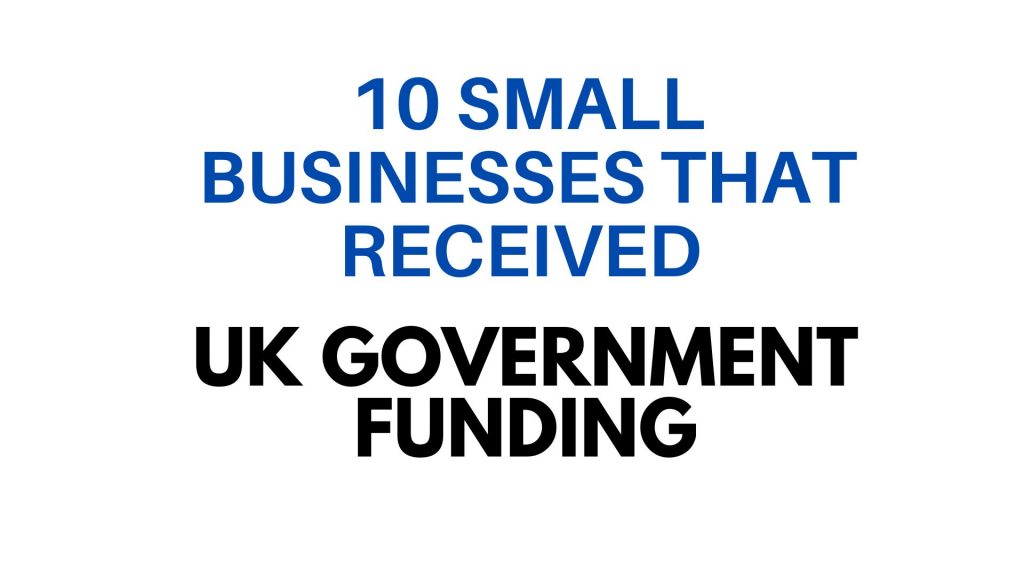10 small businesses that received UK government funding
Category: Funding & Financing
Tags: business funding, governent funding, small business funding
Small businesses are the backbone of the UK economy, accounting for 99% of all businesses and employing over 16 million people. They are also vital to ensuring that communities across the country are thriving.
Government funding is available to support small businesses in a number of ways, from start-up costs to growth capital. In this article, we will explore 10 small businesses that have received government funding and how it has helped them to grow, as well, provide you the guidance you need to ensure your success with government funding and your own small business.
Let’s review this together and see why small business is so critical.
Defining small businesses in the UK
In the United Kingdom, small businesses are defined as those with fewer than 50 employees. This definition is used for a variety of purposes, including government funding and regulation.
Small businesses make up a significant portion of the UK economy, and they are vital to the country’s continued prosperity. In order to support small businesses, the government offers a number of funding initiatives. These include loans, grants, and tax breaks.
The government also provides advice and resources to help small businesses start up and grow. By promoting and assisting small businesses, the government is helping to ensure the UK’s economic future.
Why are they important?
Small businesses are an important part of the UK economy. They provide jobs, boost local economies, and can be a source of innovation. However, they can also be vulnerable to economic downturns and government policy changes.
That’s why it’s important for the government to provide funding and other support to small businesses. By doing so, they can help ensure that small businesses are able to thrive and continue to contribute to the UK economy.
The benefits of small businesses to the economy
In the UK, small businesses are the lifeblood of the economy.
As mentioned, they provide jobs for millions of people and generate billions of pounds in revenue each year. They also offer vital services and products that keep the wheels of industry turning.
But what are the benefits of small businesses to the UK economy?
One of the most important is that they provide a source of funding for larger businesses. When times are tough and big businesses need to cut costs, they often turn to small businesses for help. This can take the form of equity investment, loans or simply outsourcing work to smaller companies. Another benefit of small businesses is that they help to create a more diverse economy.
By their very nature, small businesses are often more nimble and adaptable than their larger counterparts. This means they can seize opportunities that larger businesses might miss. As a result, they help to add vibrancy and innovation to the UK economy.
Finally, small businesses play an important role in supporting local communities. They provide jobs and essential services, and they often have strong ties to the areas where they operate.
This helps to create a sense of community and pride which can be vital in regeneration projects. In conclusion, small businesses offer a huge range of benefits to the UK economy and should be encouraged and supported.
Let’s also review government funding and the importance of the funds made available by the various funding agencies across the UK.
What is government funding?
UK small business funding is available from a number of different sources, but the main source of government funding is through the Department for Business, Innovation and Skills (BIS). There are a number of different programs that provide funding for small businesses, including the Enterprise Capitalship Scheme, which provides equity-based funding for businesses with high growth potential.
The government also provides loans and grants through the British Business Bank, which is a government-owned institution that provides financing to small businesses. In addition, there are a number of tax reliefs and other incentives that are available to small businesses in the UK.
These include the Small Business Rate Relief Scheme, which provides relief on business rates for small businesses, and the Enterprise Investment Scheme, which offers tax breaks for investors in small businesses.
To see all options available via the UK government, including the local, regional and national level options, consider using the Funding Database, as it lists out over 1,000 different government funding schemes and options for you as a small business to consider.
Types of government funding available for small businesses in the UK
Starting a small business in the UK can be a daunting task, but there is a range of government funding available to help you get started.
One of the most popular options is the Start-Up Loans Scheme, which provides access to finance and mentoring support. There is also the Enterprise Finance Guarantee Scheme, which helps small businesses access loans from banks, and the Seed Enterprise Investment Scheme, which offers tax breaks to investors in small businesses.
In addition, there are a number of regional development agencies that offer funding for small businesses in specific areas of the country.
So, if you’re thinking of starting a small business in the UK, be sure to research the different types of government funding that are available to you.
How to apply for government funding
There are a number of ways that the government can provide funding for small businesses in the UK.
One option is through grants.
The government offers a variety of grants to businesses of all sizes, and the eligibility requirements vary depending on the specific grant.
Another option for funding is through loans.
The government offers both low-interest and interest-free loans to small businesses, and repayment terms can be flexible.
Finally, the government also provides tax breaks and other incentives to businesses that are willing to locate in certain areas or that meet certain criteria. Applying for government funding can be a complex process, but there are a number of resources available to help businesses navigate the process.
By taking advantage of these resources, businesses can increase their chances of securing the funding they need to grow and thrive.
10 small businesses that received UK government funding
The below 10 small businesses that received UK government funding will give you some sort of idea and information on the type of business, the amount of funding they received, and how they have used the funding to grow their business.
Remember, you can review all funding options available in the Funding Database and become the next success story.
- Company Location: London
– Type of business: Technology
– Funding received: £1 million
– How they have used the funding: This business has used the funding to develop a new app that helps small businesses manage their finances. The app is now being used by over 1,000 small businesses across the UK.
- Company Location: Liverpool
– Type of business: Manufacturing
– Funding received: £500,000
– How they have used the funding: This manufacturer has used the funding to purchase new machinery that has allowed them to increase production by 30%.
- Company Location: Bristol
– Type of business: Retail
– Funding received: £250,000
– How they have used the funding: This retail shop has used the funding to open new stores in high footfall locations across the UK. The company now has a total of 10 stores nationwide.
- Company Location: Manchester
– Type of business: Food and drink
– Funding received: £200,000
– How they have used the funding: This food processor has used the funding to develop a new range of products that are now being sold in major supermarkets across the UK.
- Company Location: London
– Type of business: Fashion
– Funding received: £150,000
– How they have used the funding: PQR has used the funding to open a new flagship store in London. The store has been a huge success, and the company is now planning to expand into other major cities across the UK.
- Company Location: Birmingham
– Type of business: Health and fitness
– Funding received: £100,000
– How they have used the funding: This fitness industry business has used the funding to launch a new marketing campaign that has helped them reach a wider audience. The company is now one of the leading providers of health and fitness products in the UK.
- Company Location: Oxford
– Type of business: Education
– Funding received: £75,000
– How they have used the funding: This education focused business has used the funding to develop a new online learning platform that is being used by students across the UK.
- Company Location: Bristol
– Type of business: Arts and entertainment
– Funding received: £50,000
– How they have used the funding: This event management business has used the funding to put on a series of live events that have been attended by over 10,000 people.
- Company Location: Nottingham
– Type of business: Sports
– Funding received: £25,000
– How they have used the funding: This business has used the funding to purchase new equipment that has allowed them to expand their range of sports products.
- Company Location: Leeds
– Type of business: Tourism
– Funding received: £10,000
– How they have used the funding: This business has used the funding to develop a new website that helps promote tourism in the UK. The website is now being used by over 100,000 people per month.
The importance of small businesses to the UK economy
The UK is a small business powerhouse. There are an estimated 5.6 million small businesses in the country, accounting for 99% of all businesses and 58% of private sector employment.
What’s more, small businesses contribute a whopping £2 trillion to the economy each year.
Given the vital role that small businesses play in the UK economy, it’s no surprise that the government has made supporting them a key priority.
In recent years, the government has introduced a number of initiatives to help small businesses access funding and grow their operations.
For example, the British Business Bank provides loans and equity investments to small businesses, while the Start-Up Loans Company offers funding and mentoring support to young entrepreneurs.
Clearly, small businesses are critical to the success of the UK economy. With the right support from the government, they can continue to thrive and create jobs, boosting growth and prosperity across the country.
The benefits of government funding for small businesses
UK small businesses are a major source of innovation, with research showing that small businesses are twice as likely as large businesses to introduce new products or services to the market. Given their importance, it’s no surprise that the government offers a range of funding programmes to support small businesses.Take advantage of the funding options via the Funding Database now.
One of the most popular sources of government funding for small businesses is through grants.
These are typically awarded to businesses that are undertaking research and development activities, or that are looking to expand into new markets. Grants can also be used to support the training of staff, or to help with the costs of relocating to a new premises.
Another source of government funding for small businesses is loans.
These can be used for a wide variety of purposes, including working capital, investment in plant and machinery, or even to help with the costs of setting up a new business. Loans can be repaid over an agreed period of time, and many come with favourable interest rates.
Government funding can make a real difference to small businesses in the UK, providing them with the financial support they need to grow and thrive. So if you’re thinking about starting a small business, be sure to check out what government funding might be available to you.





